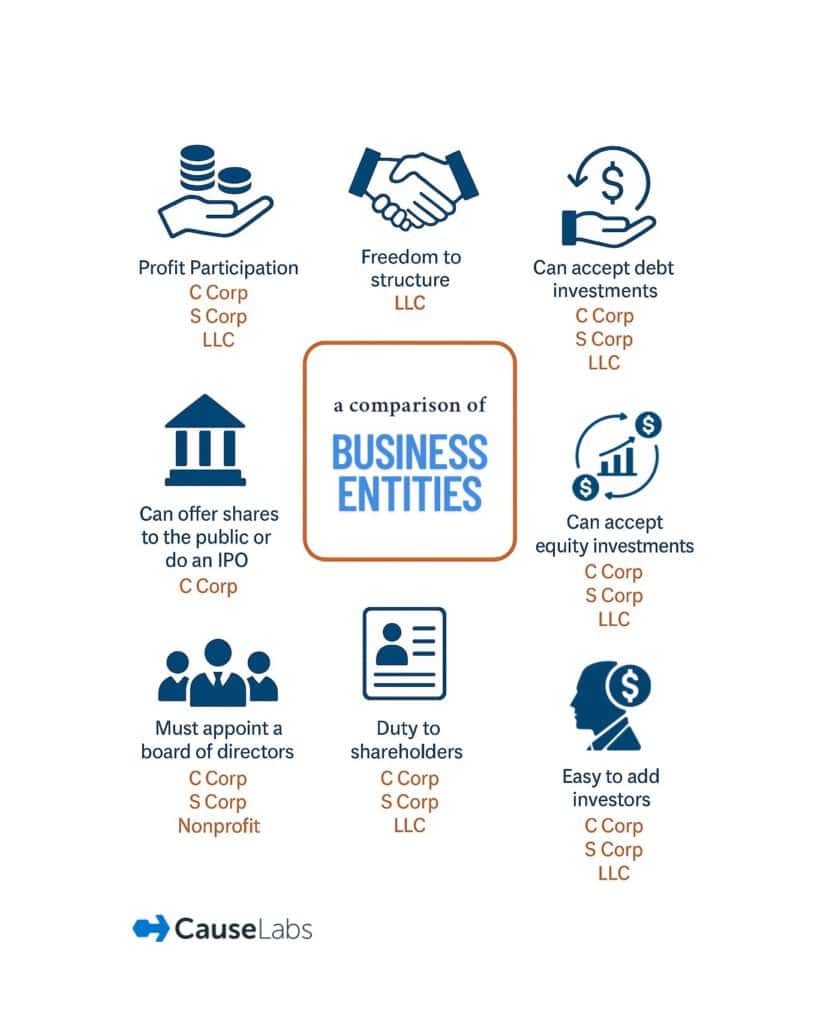Starting something meaningful is exciting. But it also brings up tough questions like: Should I form a nonprofit or go the social enterprise route? Do I need tax-exempt status to serve people well? What if I want to build an education or support community but don’t want to deal with boards, bylaws, or bureaucratic red tape?
Here’s the good news: you’ve got options. And no, you don’t have to start with a 501(c)(3) to do good.
The Quandary of Doing Good, Differently
I recently chatted with someone dreaming of a space to uplift others through shared knowledge and connection—but feeling stuck on the “right” legal structure. My first thought was, “Have you considered an LLC that’s specifically organized as a social enterprise?”
It’s not a traditional route, but it’s increasingly the right one for mission-driven founders who want flexibility, speed, and revenue-generating models that support long-term sustainability.
What Is a Social Enterprise, Really?
At CauseLabs, we define social impact companies as businesses that are profit-generating and purpose-driven. They exist to solve societal or environmental challenges. A social enterprise takes that further by baking the mission directly into the business model.
So, if you’re envisioning an education initiative, peer-support network, or online learning hub, an LLC could be your launchpad. It’s faster to form than a nonprofit, gives you full control, and allows you to earn revenue through memberships, courses, speaking engagements, or workshops. You can still accept gifts and community contributions, but they won’t be tax-deductible unless you work with a fiscal sponsor.
Legal Nuts and Bolts: Can an LLC Do That?
Yes—if it’s structured with intention. Your LLC should clearly state its charitable or social purpose in its operating agreement. Including language that commits to reinvesting profits into the mission builds public trust and aligns with IRS expectations for purpose-driven business models.
If you want a smart, real-world breakdown of legal structures for social enterprises, I recommend this talk at Harvard by my friend Kyle Westaway, a leading expert in social enterprise law. He covers the landscape in plain English—with the nuance you’d expect from someone who advises founders like us every day.
If your vision grows and you decide you do need 501(c)(3) status for grant eligibility or donor incentives, you can either convert the LLC or form a new nonprofit later. It’s not effortless, but it’s doable.

Doing Good with Revenue
I used to say that tech and business are not the Field of Dreams. If you build it, they will not come. That’s still often true. But I’ve softened. If you don’t build it, certainly no one will come. We all have to start somewhere.
These days, it’s more accessible than ever to bootstrap a startup using AI, no-code tools, and online platforms that don’t cost a fortune. Still, building a strong community—whether for education, peer support, or social change—does require an investment. Think of your early marketing and operational costs like any other business expense. It’s okay to take out a small loan or start small. You’re not “selling out” by charging for something that brings people value.
So… Should You Start an LLC or a Nonprofit?
Here’s a quick way to weigh your options:
| Things to Consider | LLC (Social Enterprise) | Nonprofit (501(c)(3) |
| Want full control | Yes | No (board required) |
| Plan to earn revenue | Yes | Possible but trickier |
| Need tax-deductible gifts | No (unless via fiscal sponsor) | Yes |
| Want to apply for grants | Limited access | Wide access |
| Prefer fast launch | Yes (days) | No (months) |
| Long-term fundraising | Challenging without status | Easier if you meet requirements |
Start Where You Are
Impact doesn’t wait for perfect paperwork. You can launch with an LLC, test your idea, serve your community, and adapt as you grow. The legal structure is a tool, not a moral badge. What matters is the value you deliver and the trust you build.
Whether you’re forming a nonprofit, starting a social enterprise, or figuring it out along the way—you’re already doing the hard part. You’re showing up with purpose.

